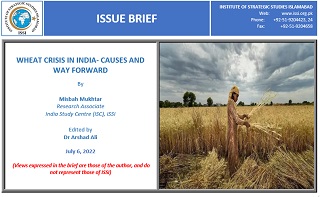Recently, India has been under a whirlpool of wheat crisis. The Indian government estimated the production of around 111.32 million metric tons (MMT) in February 2022.[1] However, the wheat production in the Rabi season has remained lower than expected. According to an estimate, Indian wheat production is likely to stay primarily between 101.3 to 105.3 MMTs.[2] Till 30th April 2022, only 16 MMT wheat was procured, which is 41 percent less than 27 percent of MMT procurement last year.[3] This has greatly affected the procurement drive of the government which has further morphed into a wheat crisis in the country.
Three main reasons account for India’s current wheat crisis including: increasing temperatures, the Russia-Ukraine war, and the crisis in demand-supply management by the government.
Rising temperatures have wreaked havoc across the globe. South Asia has also borne the brunt of climate change this summer where both India and Pakistan witnessed unprecedented heat waves reaching as high as 51 degrees Celsius.[4] The heat in March was the worst ever recorded in 122 years.[5] A report by the UK met office indicates that the heat which was previously witnessed once in 312 years, will now be witnessed every three years in the region. [6] This has and will continue to alter the lives of many including the daily workers.















